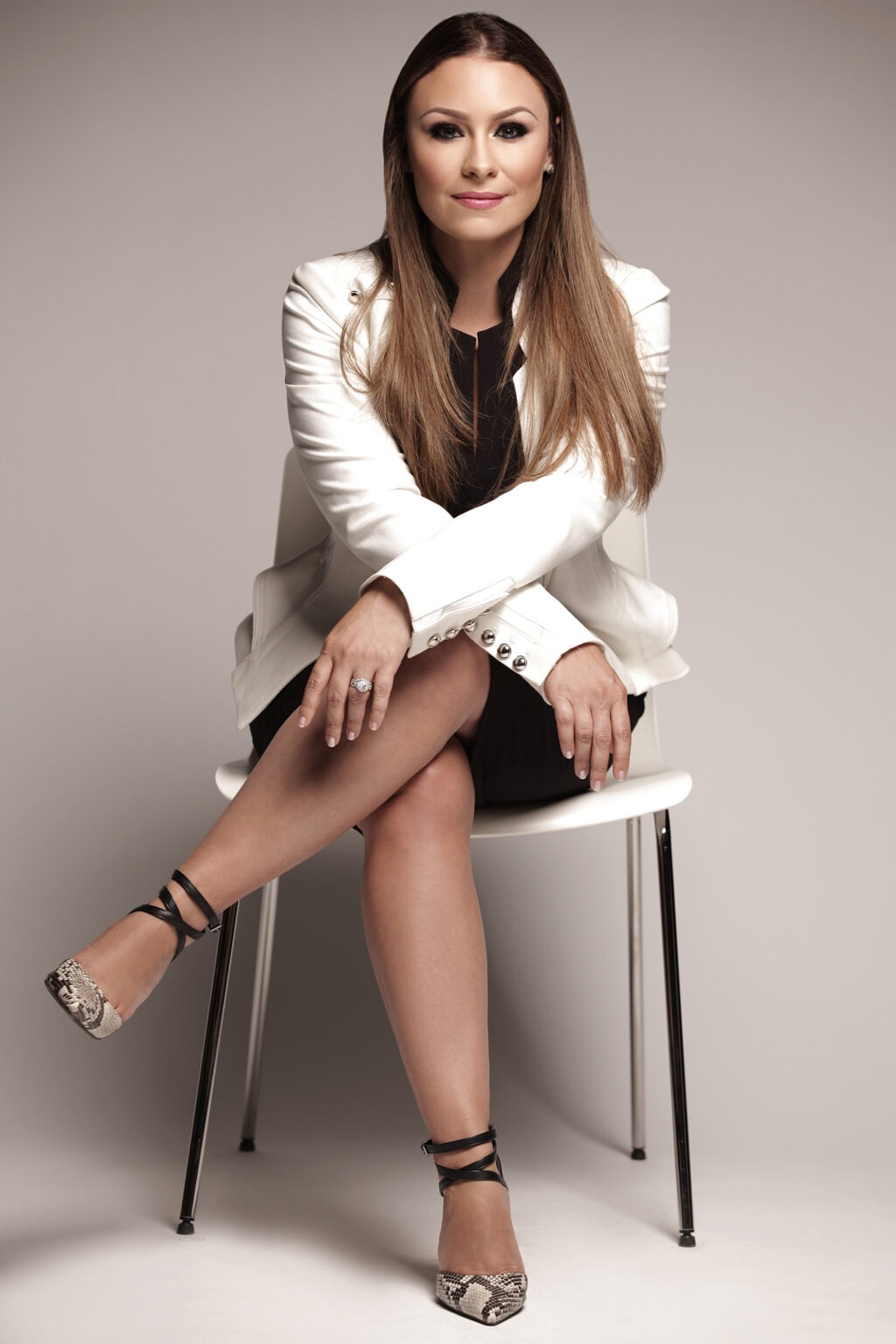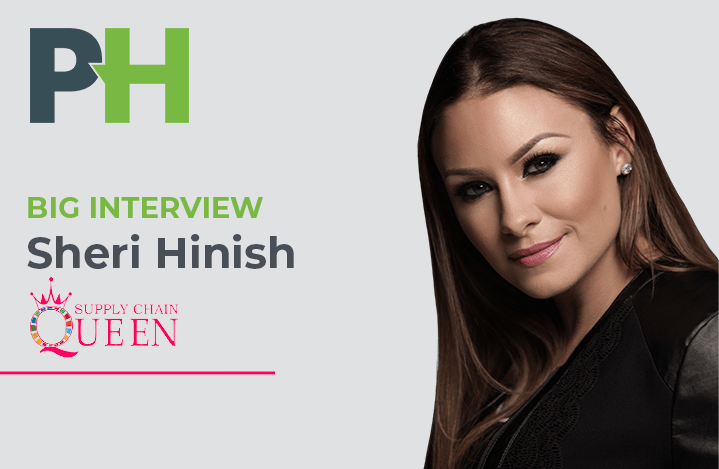For Procurement Heads‘ latest Big Interview, David Hazeldine spoke with Sheri hear more about her purpose and why she thinks sustainability is so important.
I currently work at IBM and am the Global Sustainability Lead for IBM Consulting.
When you think about the offering, the alliances, the services, the big bets, that all falls under my organisation which is incredible because I can wake up every morning and do what I love.
That is building a sustainable world, with supply chains and technology to enable circularity, climate restoration and equality for all.
I also have a popular brand, Supply Chain Queen, and a podcast that evangelises a lot of the things that we should be talking more about – the future of the supply chain and giving folks who are misrepresented or underrepresented a platform and a voice to share and talk about disruptive innovation.
Why did you get into supply chain?
I have a non-traditional career path.
I didn’t start in supply chain it was probably a third or fourth career for me.
I started as a musician and owned a couple of businesses and then I got into real estate.
I was sitting in an IT organisation and someone said, “Hey, we want to start a supply chain organisation from the ground up” and I raised my hand.
I didn’t know much about supply chain, but what drew me to it was the breadth of supply chain when you think about the different functions that it spans and the opportunity to make an impact.
Also, how technology can be used to accelerate and drive the type of responsible and equitable outcomes we need in the world. All of that was incredibly exciting to me, it was a bit scary because supply chain is just huge and so is sustainability and that is one thing I learned early on, I wanted to learn fast and be exposed to as much as I could, so I could know where I wanted to double down.
Being curious and becoming a super learner were two things that helped me accelerate my career.
I love that no matter how much technologists tell us supply chains are run on laptops it is really the people who power supply chains.
When you look at sustainability, which is something I fell into, taking a green value chain course when I was getting my first masters, I got goosebumps hearing a gentleman called Dr Kevin Lyons speak about the power of green value chain and that is when I said this is what I am devoting my life to.
I feel grateful that I get to wake up and work with great people and do cool work, we are making a difference in people’s lives and that is what matters to me.
What is the biggest hurdle you have had to overcome?
I feel so grateful that I have spent most of my career in the industry because I have that context, it is people, we often get in our way.
There are a few challenges, the capacity building making sure that people understand why, you have to have a coalition of the willing, but you also need a very clear scope and commitment from senior leaders.
You need both.
The other thing too is people need to feel connected to the work.
We have been living through this pandemic for the last two years and there is a lot of pressure to deliver customer outcomes and supply chains are at the heart of this, we power the world and the attention to worker wellbeing and to psychological safety that was probably in my career another space that was often overlooked, but critical to delivering value in my opinion.
What do you think supply chain needs to be moving forward?
The thing is we need a seat at the table in the boardroom, I have had conversations with a lot of leaders, and I think when you say supply chain management the definition can vary depending on the industry, segment and maturity of the organisation.
The other thing that is a confining factor when you think about strategy versus execution, supply chain isn’t thought of upstream, they’re not thought of as a strategic lever, they’re often thought of as a cost centre and this just isn’t true anymore.
You can have the best strategy in the world, but it doesn’t mean anything unless you can execute it.
Unless you can deliver and operationalise it, it is just another plan.
I would like for supply chain leaders to be invited to the table, have a seat at the table and be respected as a strategic value lever in business transformation.
This is just the natural evolution of business.
“My purpose is simply to make a meaningful impact for the clients, colleagues, partners, and communities I serve. I help customers design and build supply chains of the future that empower the human experience, strategically champion stewardship, and create change that is impactful, equitable, responsible, and profitable. I’d love to walk with you on your journey.”
Sherri Hinish, the Supply Chain Queen
Do you find because of the pandemic that procurement and supply chain are working more closely in tune now?
First of all, I love procurement because I think the best ideas start all the way upstream, how you design your product, the types of decisions you make can completely change your network.
Having gone through some pretty advanced LCA training, you see very quickly how important product design and procurement decisions are and I wish that more people championed the value of procurement leaders and practitioners, because this is where the value shows up in the first kilometre of your supply chain.
When you think about how you build supplier diversity into your value proposition there is so much power in that.
I am getting goosebumps talking about it because I see the power in that.
In terms of financial inclusion, risk mitigation, are you sourcing sustainably?
Do you understand who you are doing business with?
This all happens in procurement!
It happens in the supply chain too, just more broadly.
But yes, I think they are working more closely together it depends on how the organisation is set up.
I think that is more critical now too, how are you flattening your organisation to allow CXOs and communication to flow and reduce some of that functional friction that happens.
I think they have been pushed into that territory because of the responsiveness and the time to value needed with Covid.
What are your thoughts on why sustainability is so important for you and how do you think businesses need to start doing rather than just talking?
I think that sustainability is good for the planet and good for business we have made the business case.
It is interesting, we get asked so much what is the business case for sustainability and it is the biggest marketplace that we know.
I interviewed Gary Cooper and he said this to me more than a year ago, “Earth is the business case, being able to walk outside and breath air is the business case”.
But if you need more stats think about the sheer volume of people that were displaced just last year alone due to climate change, more than 30 million people, and most of those were women and children, and what a lot of people don’t realise is that if we don’t step up and get our sugar honey iced tea together by 2100 you are talking about $54 trillion annually and climate adaptation that is far more expensive than just holding to 1.5 degrees.
It makes me think about the power of the circular economy, the circularity gap report came out recently and we know that there is a $4.5 trillion market potential, but why aren’t people acting.
Consumers want sustainability there is lots of research to show that they would be willing to pay more, but why doesn’t it happen?
Why doesn’t it show up?
You mentioned ESG, tonnes of regulatory disclosure progress, 38 top economies have corporate disclosure requirements now on environmental and social impacts.
Biden came out with very specific requirements around human rights imperatives.
For me, where it gets murky, is what is the plan?
How do you operationalise it?
I think that is part of the work that we do, taking these huge ambitions and breaking them down.
I was moving around in my chair uncontrollably because 75% of the sessions all came down to ‘we need better data and insights’. After all, if you can’t visualise what is happening and you can’t quantify things it is all just a web of assumptions.

About Sheri
Sheri has an MA, in Sustainability from Harvard University as well as MS in Supply Chain Management from Rutgers University.
In 2021, Sheri was named #1 Leader in Supply Chain, Supply Chain Digital, is one of the Top 100 Women in Supply Chain, a Supply Chain Executive “Pro to Know” and was named #1 Influencer in Supply Chain by B2G Consulting last year.
How can things change?
There is taxation and a compliance arm that helps but it can’t just be through that lens, I like to think of it as a continuum it is also part of maturity, one side you might have regulatory compliance, you can tax the hell out of people, but it will only get you so far, you don’t get the trust and value orchestration and collaboration you need by industry.
When you go together you go further.
There has been a tonne of organisation around specific segments but getting into these industry-specific think tanks they are important because what is teased out is something called materiality, so you set your ambition, maybe it is grounded in the sustainable development goals but at some point, you have to get into the nitty-gritty.
What are the key issues you are facing and how can you make the most impact?
You see a lot of synergies where when you start moving into really rethinking your product design and thinking about networks there is a lot of really cool things, we don’t have to get into, but you have to be able to understand materiality and collaborate with others in your field.
I think the other important thing is ESG reporting is hard, and we need to just admit it is a hot mess right now, it is very manual, it is three to six months in Excel, often times the data lacks chain of custody, but largely, it is divorced from your system of record.
When people are making decisions, they need to be able to understand the trade-offs in choosing a supplier, for example, they need to know how the one tiny transactional decision is tied to our company’s brand values, in the corporate agenda and also your values.
We covered ambition, collaboration, materiality, ESG reporting and once you can visualise what is happening that is when the magic happens.
A lot of people want to go straight from compliance lens to optimisation, let’s just optimise the hell out of everything!
I came from that job and what found was we would spend months in these projects, optimising tens and tens of people on these projects when what we needed was design thinking and co-creation.
This is an example I use – the continuous improvement of the candle did not lead to the creation of the lightbulb. We end up optimising for problems sometimes that we have designed instead of just stepping back and rethinking things.
In-between compliance and optimisation I try and slide in innovation and rethinking and that is through co-creation. All of these things are a continuum and at the very end is trust, experience, do people believe, do they choose you the very human emotion.
That is that continuum of the stick, carrot and then love, love in the world.
Using Unilever as an example, they are miles ahead when it comes to their agenda.
If a business of that size can embrace it why aren’t others doing it? What is stopping them from accelerating at the same pace?
I think a lot of it is we have always done it this way, so, as I mentioned, what happens is you have a lot of senior leaders who have made some big bets and other people in the organisation who perhaps develop this strategic point of view that has been adopted and it is not working but it is the politics of moving backwards and undoing what has been undone – it is like the fabric of an organisation, so I find that people get hung up they get in their way of progress.
When you allow politics to dictate where you show up as a brand and define your values that is where I find people get hung up.
That’s where it happens.
Fortunately for us, we are a real reflection point, especially in supply chain.
I think Gartner came out with a study last year that said half of our workforce by 2023 will be comprised of millennials.
We already know the personas of millennials, they are demanding that companies stand up and commit to sustainable outcomes and have documented the performance of these commitments.
It is changing because it is top-down, do you have regulatory pressure, senior leadership making public-facing commitments and then you also have the bottom up.
The best talent in the world won’t choose your company, it has to happen.
That is the inflexion point, who makes the change happen?
It is that mid-level of leadership in a company and I think that the tide is changing. I am hopeful that we have people who are committed to sustainability and they have a growth mindset that everything is possible.
Bringing suppliers and consumers into our journey and giving that end-to-end experience can demonstrate not only customer and brand loyalty but even with the supplier agreements when you start thinking about how you incentivise the right behaviours because in my career, I know suppliers get beat up a lot!
It takes a toll on everyone, and it is not about the lowest price anymore.
How does it feel to be a woman at the top of what has historically been quite a male-dominated function?
You know what, it is better than it has been, but we have a long way to go.
I wasn’t someone who was outspoken in my past but social media was a great tool.
I think that I stepped out of my shell when sharing and posting then I realised so many people feel like I do and I can help them and that has been an incredible journey, but I don’t want to give anyone false expectations, it is still hard.
I have been discriminated against several times in my career.
Sometimes around fair pay, it was just what happened when you’re the only woman on a team.
It is still an issue.
You have to be intentional and you have to insist on making room.
I have a diverse team, diverse teams outperform.
Gender diversity and ethnic diversity. There is cognitive diversity that happens. Lots of research shows when you have that diverse mix on a team you can unpack and rethink complexity more effectively especially at scale. You are also able to have the customers that you serve represented in the conclusions that you are giving them.
We also have to work very hard to create inclusive environments.
A lot of the women I meet, really bright women who are far smarter than me that I hire, say I don’t want any favours. I just don’t want anyone stepping on my neck and that is that feeling that people don’t realise. It is more often than not an education.
Maybe people don’t know, maybe it is micro-aggression but none has ever stopped to tell them about a comment they made and why they shouldn’t do it again and how it made someone feel.
Be intentional, insist on making room, model the right behaviours, tie it to performance incentives and be selfish you are leaving value on the table if you don’t prioritise diversity.
Who has had the biggest impact on your career?
My children.
I didn’t think that I would be a mum.
I thought, like a lot of sustainability advocates, there is a sense of bringing another life into the world the way it is and am I contributing to the mass population.
But I actually got pregnant unexpectedly with my first child and it changed my life.
I felt like I was wandering through life constantly trying to solve problems.
Becoming a mother gave me purpose beyond measure.
Looking at their faces and knowing that they are why I do this, I have to do this, this is for my babies and their babies.
It has been a north star for me, and it helps me dig deeper.
I learned a new concept last week called eco-anxiety, my daughter is eight and she came home from school and wasn’t herself and she said she was really sad, sad for the planet and climate change happening and people aren’t going to have food to eat.
I was trying not to cry but I realised that my children are always listening.
We talked about worker wellbeing and mental health and checking in on people especially in year two of this pandemic.
How do we adopt mental health training and support to include eco-anxiety, which is very real, especially for our younger people.






